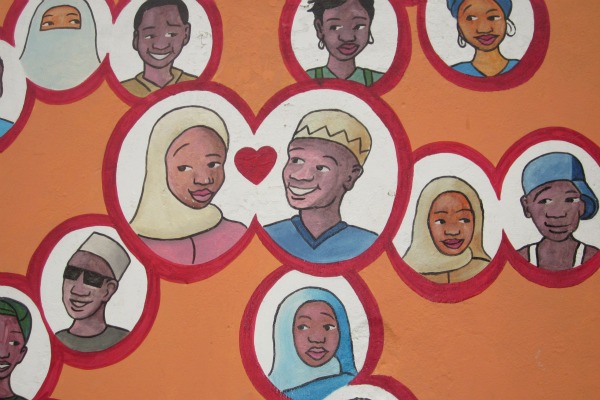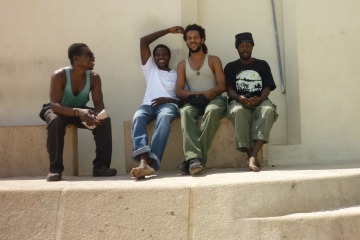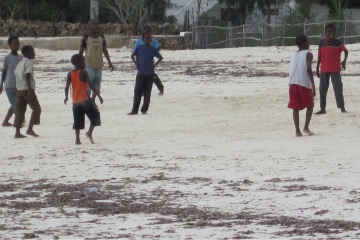Guide to Swahili street
slang in Stone Town,
Zanzibar
All photos by author.
Mambo! It’s the classic street slang for “what’s up?”
in Stone Town,
Zanzibar and in most of urban East
Africa. It literally means, “things” or “issues”?” The upbeat term
is often paired with the word vipi (how)
as in, Mambo, vipi? How
are things?
There
are at least 20 ways to answer the popular question that I never learned in
formal Swahili classes. The gap between school
and street could not be wider than in Stone
Town, Zanzibar’s capital city, a UNESCO World
Heritage site, that nearly 400,000 residents call home. Here, the lugha
ya kisasa “slang” or lugha
ya mitaani “street
language” changes by the minute, mostly by young people who flip or shine an
old word, or fashion a completely new one, inspired by hyper-local contexts,
meanings, and realities.
I
thought I knew Kiswahili. I’d earned an “advanced” certificate at the State
University of Zanzibar. The program prides itself on teaching a kind of Swahili
described as sanifu(standard) or fasaha (clean). It was rigorous and foundational,
but it left me speechless (more like a “beginner”) every time I left the
classroom and headed down Stone
Town’s boisterous
streets, where social greetings happen at every corner and turn. You really
can’t walk from point A to point B in Stone Town
without getting involved in greeting loops with friends and strangers alike.
Perhaps
the gatekeepers of Standard Swahili do not want to accept that Stone Town youth
have been and continue to be deeply influenced by Sheng – a kind of Swahili ‘patois’ that
developed by urban youth in Eastern Nairobi in the 1970’s and spread, overtime,
into all realms of East African life as a legitimate form of expression. While
most Zanzibaris still speak a more formal Swahili, youth here are tapped into
regional and global influences like music, film, and fashion that daily change
the contours and textures of street Swahili. The most immediate example of that
lives within the brackets of Swahili
street greetings.
|
Not greeting
someone, especially when they greet you first, is often seen as a straight-up
insult, if not a totally rude and ignorant act explained only by the cruelty
of a changing, globalized world.
|
Maamkizi (greetings) are a major part of Swahili culture. Not
greeting someone, especially when they greet you first, is often seen as a
straight-up insult, if not a totally rude and ignorant act explained only by
the cruelty of a changing, globalized world. It’s true, the extended greeting
is old-school, a shout-out to simpler times, when everyone had and/or took the
time to truly acknowledge who they were passing on the street.
Everyone
learns lugha ya heshima –
language of respect — which is a detailed, hierarchical system of greetings
depending primarily on age but also on status. The official way to greet,
depending on who you talk to and where, happens at least five different ways,
often accompanied by hand-shaking, hand-kissing, or at least a wave.
1. Shikamoo! Marhaba
For young greeting the old
“I hold your feet” “You are welcome [to do so].”
2. A-Salamu Alaykum! Wa-alaykum Salaam
A Muslim greeting
“Peace be upon You!” “Upon You, Peace.”
3. Hujambo? Sijambo
For greeting your peers/equals
“You don’t have an issue?” “I don’t have an issue.”
4. Habari yako? Nzuri (sana)!
Again, for peers/equals, everyone
“Your news?” “Good (very)!”
5. Chei-chei? Chei-Chei!
An endearing exchange initiated by a child to
any adult, usually accompanied by a handshake and small curtsy
These greetings all have their appropriate,
predictable follow-up questions about work, home, family, and health. Enter the
street-realm, though, and you hear a spicy mix of playful responses that
usually get lost on the tourist, who feverishly studied the back of a guide
book that couldn’t possibly capture the live, changing Swahili on the streets.
Stone Town’s
greeting culture is an essential part of anyone’s experience in Zanzibar, whether you
stay for a day or a lifetime. I wanted to get it right, but every time I tried
to throw down my textbook greetings, I got the pity-smile, followed by a flash
word-flood, a whole slew of fresh words thrown out as a string of slang.
I often had no idea what people were saying or
what they meant, until I really listened. After a while, I got used to the way
words arrive fresh like bread on the street each day — you gotta grab a hunk of
what’s hot and speak it, share the loaf.
This is the kind of Swahili that will make
your mabibi na mababu (grandmas and grandpas) cringe. It’ll make your
professors hang their heads down low, shaking with dismay. It’ll alarm police,
leaving them to think you’re ballsy, disrespectful, or clueless. But for most
people, it will definitely give you some cultural cache, local clout, or urban
charm.
Each word is a wink-wink of belonging.
So
here’s my quick guide to 20 of the hottest ways to respond to Mambo,
vipi?! next time
you’re in Stone Town:
1. poa
The universal way to say “cool!” but it really
means “recover” “calm” or “warm” (as in food that’s not too hot to eat)
Variation: poa
kichizi (kama ndizi) — crazy cool (like a banana)
2. shwari
A
nautical reference meaning “smooth/even” to describe the quality of the waves.
When there are no rough waves or wind, the sea is nice & smooth, easy to
travel. To say shwaremeans life’s journey is smooth like the sea.
3. bomba
Means “awesome!” It could also mean
“beautiful” or “nice” which some say was first used by Italian sailors (“bomb”)
and then transformed over time. It literally means “pipe,” which possibly refers
to an older Swahili-slang drug references like “syringe” used in Nairobi, Kenya.
Here in Stone Town, it’s another way to say, “Life’s
awesome, fantastic.”
4. bombom
As in “bomb,” “bombshell” or “machine gun.” It
also refers literally to “influenza” or “pneumonia” but in terms of greetings
can playful mean life is “killer” “hot” or “sick.”
5. rasmi
Means “official” — as in, everything’s good
because they’re in order.
6. safi
To say things are safi is to say you have a clean heart, life’s
good, no dirty business going on in your life. It literally means “clean,”
“clear” or “pure.” It also might be used to say that things are “correct/in
order.”
7. salama
Means “peace,” as in, all’s well, peace
prevails, no fighting with anyone or anything. The word itself is derived from
the Arabic word, salam.
8. mzuka
Literally means “worry,” “desire” or “moral.”
As a figure of speech, it’s been associated with the sudden, pop-up appearance
of a spirit or ghost. Oddly enough, through various hip-hop lyrics, the word
has a totally different meaning: it’s now used on the streets to mean
“excellent” or “fantastic.”
9. freshi
Slang for the English word “fresh,” sort of
related to safi.
It’s derived from global hip-hop vocabulary, whereby anything “fresh” is really
new and good.
10. hamna noma
A favourite with Stone Town
youth, it means, there is no “obstacle” whatsoever — no problems at home or
anywhere.
11. kama kawa
Shorthand for “kama
kawaida” that translates to “like usual.”
12. kiasi
The word means “size” or “moderate amount” and
is often heard in the markets or when talking about a purchase. To say kiasi in
a greeting means eh — I’m fine.
13.wastani
Similar to kiasi, meaning “standard” or
“average” as in, eh — fine, not good or bad, just here.
14. mabaya!
Means “bad!” as in, truly, things are not
going well, or playfully, things are going so bad, they’re good. In a culture
that doesn’t officially permit the expression of negative feelings in public,
this slang is a playful chance to vent without being taken too seriously.
15. mzima
Usually refers to the body’s state of health
and well-being, literally meaning “full” or “whole.” This is actually a
“standard” response but if you say it with enthusiastic pop, it takes on a
street flavour.
16. mpango mzima
Means “full plan” as in, “I have my act
together” or “’I've got it all figured out.”
17. fiti
Literally comes from the English word “fit” as
in physically healthy, but is used to mean that life itself is fit and strong.
18. shega
Another way to say “cool” literally meaning “fine”
or “nice.”
19. kamili
“Complete,” “perfect,”” “exact” or “precise.”
20. hevi
Literally means, “heavy” as in the English
word, to signal life’s intense, deep, or a burden.
If you
tag the word sana (very) orsana, sana (very, very) to the end of most of
these words, you’ll stretch their power and sentiment. Example: Bomba
sana!
Hitting
the word with kabisa(totally) will punctuate the sentiment, giving
it some verve. Example: Freshi kabisa!
Adding
the word tu (just)
to the end of most words will cut the effect a bit, sending the message that
the state you described is just that, nothing more, nothing less. Example: Poa,
tu or Freshi,
tu.
Doubling
some words will give your sentiment extra power. Example: poa-poa, freshi-freshi,
or bomba-bomba. You should probably save this, though,
for when things really are going extremely well for you.
Mambo! reigns supreme as the number one way to strike up a
street-and-greet. But usually, if time allows, people end up showing off a kind
of linguistic fireworks where, through the prompting of various other ways of
saying “what’s up,” they get to rattle off two, three ad infinitum questions
and answers in a single breath. It’s kind of like greetings-acrobatics.
So,
beyond the initial Mambo! here
are a few other ways to keep the conversation rolling naturally (that also hold
their own as conversation kick-starters):
1. Hali, Vipi? Hali? or Vipi, hali?
Literally means, “condition, how?” or “how’s
your condition?”
2. Je/How forms:
Inakuwaje? – How is it?
Unaendelaje? – How’s it going?
Unaonaje? – How do you see things?
Unasemaje? – How do you say it?
Unajisikiaje? – How do you hear/feel?
3. One-word prompts:
Vipi! Literally means, “how?”
Habari! Literally means, “news?”
Sema! Literally means, “say!”
4. Lete/Bring forms:
Lete
habari! – Bring the news!
Lete mpya! – Bring
what’s new!
Lete stori! – Bring the story!
Lete zaidi! – Bring more!
5. Za/Of forms:
Za
saa hizi? – [of] the moment?
Za siku? – [of] the day?
Za kwako? – [of] your place?
This greeting thing could go on and on,
spiralling into story-sparring and reminiscing, politicking and lamenting. If
you really have to wrap up a long loop, though, there are a few classics that
have withstood the test of time.
Take a
deep breath in, sigh, offer out your hand for a shake or a Rasta-style
fist-pound, and then say haya, baadaye (okay, later!) or haya,
tutaonana! (okay,
we’ll see each other!). If you need to offer an explanation, simply saying niko
busy (I’m busy) or nina
haraka (I’m in a
hurry) usually does the trick. And then you’re off! That is, until you meet
someone else on the street, and the greeting game starts all over again with an
equally upbeat, mambo, vipi?!By the time you read this, it’s possible
that 20 new words are flip-flopping around, going through try-outs and
show-times.
The most popular end-phrase in a greeting loop
on the island of Zanzibar is the timeless:
Tuko
pamoja – We’re [in this]
together.
The heart-felt sentiment, echoed back and
forth between greeters at the end of any Stone Town street-and-greet, really
does say it all.
Tuko
pamoja.
Haya,
niko busy – baadaye.
ABOUT THE
AUTHOR
Amanda
Leigh Lichtenstein
Originally from Chicago, IL, Amanda currently lives in Stone
Town, Zanzibar, where she works as the Resident
Director of a Swahili Overseas Flagship Program at the State University of
Zanzibar. When she's not obsessing over kanga textiles or Kiswahili proverbs,
she's experimenting in the kitchen or traveling along the Swahili coast. Her
writing most recently appears in Mambo Magazine and Contrary Magazine.




